 |
|
| Motto |
Honestas et Diligentia
|
|---|---|
|
Motto in English
|
Honesty and Diligence |
| Type | Private university |
| Established | 1906 |
| Founder | Gleason L. Archer [1] |
| Accreditation | NEASC |
| Endowment | $246.2 million (2020)[2] |
| Budget | $300 million (FY 2017) [3] |
| President | Marisa Kelly[4] |
| Students | 7,560 |
| Undergraduates | 5,290 |
| Postgraduates | 1,165 [5] |
| Location |
,
,
United States
42°21′28″N 71°03′40″W / 42.3579°N 71.0610°W |
| Campus | Urban |
| Colors | Navy Blue and Gold[6] |
| Nickname | Rams |
|
Sporting affiliations
|
NCAA Division III Commonwealth Coast Conference Eastern College Athletic Conference |
| Mascot | Hiram (Rammy) the Ram[7] |
| Website | Official Website |
 |
|
Suffolk University is a private research university in Boston, Massachusetts. With 7,560 students (includes all campuses, 7,379 at the Boston location alone), it is the eighth-largest university in metropolitan Boston. It was founded as a law school in 1906 and named after its location in Suffolk County, Massachusetts.[5] The university's notable alumni include mayors, dozens of U.S. federal and state judges and members of the U.S. Congress.[8] The university is also host to its namesake public opinion poll, the Suffolk University Political Research Center.[9]
The university, located at the downtown edge of the historic Beacon Hill neighborhood, is coeducational and comprises the Suffolk University Law School, the College of Arts & Sciences, and the Sawyer Business School. It has an international campus in Madrid in addition to the main campus in downtown Boston.
The university's sports teams, the Suffolk Rams, compete in 19 varsity sports in NCAA Division III as members of the Commonwealth Coast Conference.[10]
History
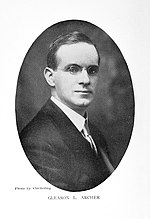
Suffolk University was initially founded as a law school in 1906 by Boston lawyer Gleason Archer Sr., who named it "Archer's Evening Law School," intending it for law students who worked during the day. The school was renamed Suffolk School of Law in 1907, after Archer moved it from his Roxbury, Massachusetts home into his law offices in downtown Boston.
A year later the first of Archer's students had passed the bar, leading to a boost in registration.[11] The school's original goal was to "serve ambitious young men who are obliged to work for a living while studying law."[11]
By 1930, Archer developed Suffolk into one of the largest law schools in the country, and decided to create "a great evening university" that working people could afford.[11]
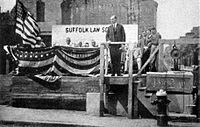
The school became a university in the 1930s when the Suffolk College of Arts and Sciences was founded in 1934 and the Sawyer Business School—then known as the College of Business Administration—in 1937. That same year, the three academic units were incorporated as Suffolk University.[11]
During the 1990s Suffolk constructed its first residence halls, began satellite programs with other colleges in Massachusetts, and opened its international campuses.[11] From 1990 to 2005, its endowment increased over 400%, to approximately $72 million, and enrollment climbed.[12]
Presidents (1906–present)
- Gleason Archer Sr. (1906–1948)
- Walter Burse (1948–1954)
- Robert Munce (1954–1960)
- Dennis C. Haley (1960–1965)
- John E. Fenton (1965–1970)
- Thomas Fulham (1970–1980)
- Daniel Perlman (1980–1989)
- David Sargent (1989–2010)
- Barry Brown (2010–2012) (interim)
- James McCarthy (2012-2014)
- Norman R. Smith (2014–2015) (interim)
- Margaret McKenna (2015–2016)[13]
- Marisa Kelly (2016–present)
Campus
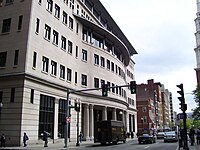
The main campus in downtown Boston is situated on well-known Beacon Hill, adjacent to the Massachusetts State House and the Massachusetts Supreme Judicial Court. Up until 1995, Suffolk was a commuter-only school. Today, there are four coed residence halls, housing over 65% of freshman, and a total of 24% of the entire undergraduate population:
- Smith Hall
- Nathan R. Miller Hall
- 10 West
- Modern Theatre
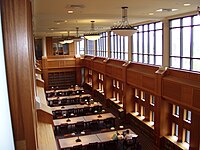
The residence hall at 150 Tremont Street, renamed Smith Hall in 2018, was the first built by the university and currently houses students in singles, doubles, quads, and suites, with communal bathrooms.
Nathan R. Miller Residence Hall (located at 10 Somerset St.) was opened in 2005 and houses 15 floors of freshman, and 2 floors of sophomores in singles, doubles and quads, with bathrooms shared between every two rooms or one bathroom per quad.
The 10 West Residence Hall, opened in 2008, has housing for freshman and sophomores in singles and doubles. Suites accommodate 3-5 students and a variety of apartment-style suites (that include full kitchens) house 2 to 8 students.
Both Miller Hall and 150 Tremont have cafeterias. Students living at 10 West/Modern Theater can eat at 150 Tremont. Suffolk University occasionally leases additional properties (such as the Hyatt & Holiday Inn Beacon Hill). If leased, those locations house freshman students.
The Modern Theatre Residence Hall opened in the fall of 2010 and is considered an extension to the 10 West Resident Hall. The two residence halls share one entrance at 10 West Street. The Modern Theater Residence Hall is built over the restored Modern Theatre (Boston).
In the fall of 2020, the university added a new residence hall, the Ames Building at One Court Street, which it purchased in the fall of 2019.[14]
In addition to its main campus in Boston, there is a satellite campus in Madrid, Spain. A Dakar, Senegal, campus operated from 1999 to 2011.
Buildings
Suffolk University has many different buildings that are spread through downtown Boston and Beacon Hill.
- Nathan R. Miller Hall: Residence Building (10 Somerset Street)
- One Beacon Street: Few floors for academics (1 Beacon Street)
- Smith Hall: Residence Building (150 Tremont Street)
- Samia Academic Center (The SAC): Academic Building (20 Somerset Street)
- Frank Sawyer Building: Academic Building (8 Ashburton Place)
- Rosalie K. Stahl Center: Academic, Administration, Library Building (73 Tremont Street)
- David J. Sargent Hall: Law, Graduate Building (120 Tremont Street)
- Modern Theatre: Theatre, Residence Hall (523-525 Washington Street)
- 10 West Residence Hall: (10 West Street)
- Ridgeway Building: Athletics/Gym, Suffolk University Police Headquarters, Michael & Larry Smith Fitness Center (148 Cambridge Street)
- Ames Building: Residence Hall (1 Court Street)
- Athletic Fields & Complex: (150 Porter Street)
Former buildings
- C. Walsh Theatre (55 Temple Street) - sold
- Frank J. Donahue Building (41 Temple Street) - sold
- Gleason L. & Hiram J. Archer Building (20 Derne Street) - sold
- Fenton Building (32 Derne Street) - sold[15]
- The New England School of Art & Design (75 Arlington Street)
Academics
Suffolk employs over 900 full-time and adjunct faculty members, who instruct approximately 10,000 undergraduate and graduate students on its Boston Campus.[16]
The Sawyer Business School (previously the Sawyer School of Management) focuses on global business education.[17] It offers undergraduate and graduate degrees. Joint degrees are also offered. About 3,000 students are currently enrolled in all programs. The Saturday-only Executive MBA Program incorporates four off-site one-week seminars and week-long global trips to Madrid and China. The Global MBA is a specialized MBA in international business with an intensive concentration in either finance or marketing. The full-time program includes a 3-month internship outside the student's home country. Summer 2010 Global MBA internships are in 10 countries. Part-time Global MBAs complete either a global experiential research project at their place of business or a 3-month consulting project that includes an intensive 2 week residency outside the US.[18]
The Suffolk College of Arts and Sciences has seventeen academic departments which offer more than seventy undergraduate and graduate programs. Among the departments is the New England School of Art and Design (NESAD)[19][20]
Suffolk University Law School, founded in 1906, offers a standard Juris Doctor program and advanced L.L.M. program. 43% of applicants were admitted to the J.D. program in 2005.[21]
The university is also home to various research centers and institutes, including the Centers for Crime & Justice Policy Research, Restorative Justice, and Women's Health and Human Right, the Moakley Archives, the Poetry Center, Political Research Centers, and the Sagan Energy Research Laboratory.[22] The Suffolk University Political Research Center (SUPRC) conducts various scientific polls of national and regional political issues.[23]
The university also has an undergraduate honors program[24] in the College of Arts & Sciences and Sawyer Business School. Freshman and transfer students are considered for the Honors program upon applying to Suffolk. Students in their second year are considered candidates for join the program by remaining one year at the institution with a 3.5 GPA. The student from Suffolk University upon graduating from the honor program graduate with a Latin Honor: Summa Cum Laude, Magna Cum Laude: You must have a cumulative GPA of 3.7, or Cum Laude.[25]
Rankings
In 2018 U.S. News ranked Suffolk #177 (tie) in National Universities.[26] In 2009 U.S. News ranked Suffolk in the "top tier of "Best Master's Universities in the North" and #7 in "Best College: Most International Students" attending master's programs."[27] The 2015 edition of U.S. News publication ranked Suffolk Law School 20th in the United States for its legal clinics, 13th for its Alternative Dispute Resolution program, and 6th for its Legal Writing. The ILRG also has numerous other categories and ranks Suffolk University Law School as the 68th most selective law school, 45th for job placement before graduation, 78th for job placement after 9 months, 23rd for best bar passer rates among first time takers, 14th when ranking the school versus the state average for bar passage rates, 92nd for student to faculty ratio and 87th overall for student median LSAT/GPAs.[28][29][30][31][32] Law & Politics' 2010 ranking of law schools ranked Suffolk University Law School 33rd overall.[33] In 2010, The Social Science Research Network ranked Suffolk 25th in the country.[34] Leiter's ranking of most desirable law schools lists Suffolk as the 35th most desirable law school in the country.[35][36] Law.com ranks Suffolk 54th overall for best job placement and employment trends into "BigLaw" with eleven percent of the class entering Big Law.[37][38] In 2010, The Hylton Rankings placed Suffolk University Law School 94th overall among all law schools.[39]
Athletics
Suffolk University teams participate as a member of the National Collegiate Athletic Association's Division III. The Rams are a member of the Commonwealth Coast Conference (CCC) and the Eastern College Athletic Conference (ECAC). They were a member of the Great Northeast Athletic Conference (GNAC) from 1995 to 2020. Men's sports include baseball, basketball, cross country, indoor and outdoor track and field, golf, ice hockey, soccer and tennis; while women's sports include basketball, cross country, indoor and outdoor track and field, ice hockey, soccer, softball, golf, tennis and volleyball.[40][41]
Notable persons
Notable alumni
- Paul Benedict, Broadway actor (Hughie, the Music Man), director, television and actor (Bentley on the Jeffersons, the Goodbye Girl, Sesame Street, This is Spinal Tap, Waiting for Guffman, A Mighty Wind)[42]
- Eliza Dushku, actor (Buffy the Vampire Slayer, Bull), activist
- John Hynes, class of 1924, 49th Mayor of Boston
- Thomas J. Lane, class of 1925, U.S. Representative from Massachusetts (1941–1963)
- James A. Burke, U.S. Representative from Massachusetts (1959–1979)
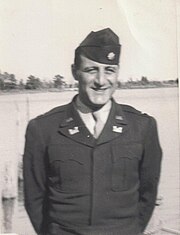
- Gleason Archer Jr., class of 1939, theologian, author
- William L. Uanna, class of 1942, officer at the Central Intelligence Agency from 1949 to 1951, Counter Intelligence Corps (CIC) as Director of Operations of the I Service Command, security expert on The Manhattan Project
- Martin F. Loughlin, class of 1951, U.S. District Court of New Hampshire, judge (1979–1995)
- Thomas Michael McGovern, college president[43]
- David Sargent, class of 1954, President of Suffolk University (1989–2010)
- Joe Moakley, class of 1956, U.S. Representative from Massachusetts 1973–2001, chairman of the U.S. House Committee on Rules
- Judge Frank Caprio, class of 1965, television judge Caught in Providence on ABC; Chief Judge Providence, R.I. Municipal Court
- Gunnar S. Overstrom Jr., class of 1968, vice-chair of Fleet Boston and president and chief operating officer of the Shawmut National Corporation.
- James Sokolove, class of 1969, television personal injury attorney
- Robert L. Caret, class of 1969, Chancellor of University System of Maryland
- Richard J. Leon, class of 1974, U.S. District Court of the District of Columbia, judge (2002–present)
- Paul Reiber, class of 1974, Chief Justice of the Vermont Supreme Court
- James Bamford, class of 1975, journalist, author
- Francis Flaherty, class of 1975, Justice of Rhode Island Supreme Court
- William F. Galvin, class of 1975, Secretary of State of Massachusetts
- Dan Harrington, poker player, winner of 1995 World Series of Poker, member of Poker Hall of Fame
- Robert A. DeLeo, class of 1976, member of the Mass. House of Representatives (served 1991 – present) 85th Speaker of the Massachusetts House of Representatives
- Jerald G. Fishman, class of 1976, President & CEO, Analog Devices
- John F. Tierney, class of 1976, U.S. Representative from Massachusetts 1997–2015, former chairman of the Subcommittee on National Security and Foreign Affairs

- Paul Suttell, class of 1976, Justice of Rhode Island Supreme Court
- John Loftus, class of 1977, author, television commentator
- Maureen Goldberg, class of 1978, Justice of Rhode Island Supreme Court
- Ronald Machtley, class of 1978, President of Bryant University, U.S. Representative from Rhode Island (1989–1995)
- Michael E. Festa, class of 1979, member of the Mass. House of Representatives (served 1998 – present)
- Nina Mitchell Wells, Secretary of State of New Jersey, 2006–present
- Martin Meehan, class of 1981, U.S. Representative from Massachusetts 1993–2007, former chairman United States House Armed Services Subcommittee on Oversight and Investigations, current President of the University of Massachusetts
- Joan Vennochi, class of 1984, Pulitzer Prize winner, investigative journalist The Boston Globe
- Cheryl Jacques, class of 1987, Legislator, President of the Human Rights Campaign
- Edward M. Augustus Jr., class of 1987, city manage for Worcester, Massachusetts
- Patrick C. Lynch, class of 1992, Attorney General of Rhode Island
- Gary Christenson, class of 1990, 1992, and 2003 (triple alumnus), Mayor of Malden, Massachusetts
- Allan Fung, Class of 1995, Mayor of Cranston, Rhode Island
- George Sifakis, Class of 2000, Director of the White House Office of Public Liaison
- Jenna Mourey (Jenna Marbles), class of 2008, YouTube personality
- Michelle Leonardo, class of 2013, Miss New Jersey USA 2012, Miss New Jersey Teen USA 2008 and Top 10 at Miss USA 2012
- Nick Cafardo, Boston Globe sports reporter and columnist, 2017 Massachusetts Sports Writer of the Year and 2017 recipient of the Boston Baseball Writers' Association of America's Dave O'Hara award.
Notable faculty and trustees
- Patricia Brown, Emeritus Law Librarian and Professor
- Joseph Glannon, Professor, well-known writer of Torts and Civil Procedure texts
- Joseph P. Hoar, Trustee, Commander in Chief of U.S. Central Command
- Gerald Peary, Professor of Communications, noted film critic, reviewer, and columnist
- Susan Starr Sered, Senior Research Associate at Suffolk University's Center for Women's Health and Human Rights, author of books on women's health
- Ronald Suleski
References
- ^ "Suffolk History". Suffolk University Boston. Archived from the original on May 25, 2018. Retrieved May 25, 2018.
- ^ As of June 30, 2020. U.S. and Canadian Institutions Listed by Fiscal Year 2020 Endowment Market Value and Change in Endowment Market Value from FY19 to FY20 (Report). National Association of College and University Business Officers and TIAA. February 19, 2021. Retrieved February 20, 2021.
- ^ "Budget & Financial Planning". Suffolk University Boston. Retrieved May 25, 2018.
- ^ "President". Suffolk University Boston. Archived from the original on May 25, 2018. Retrieved May 25, 2018.
- ^ a b "Suffolk At a Glance". Suffolk University Boston. Retrieved May 25, 2017.
- ^ "Section 1: Visual Identity Guidelines" (PDF). Suffolk University Boston. Retrieved May 25, 2018.
- ^ "Suffolk University's mascot, Hiram the Ram, is unveiled at Class Day, 1950". Suffolk University Boston. Retrieved August 10, 2020.
- ^ Suffolk University Magazine - Alumni (accessed 2015)
- ^ "Suffolk University Political Research Center (SUPRC) - Suffolk University". www.suffolk.edu. Retrieved March 28, 2022.
- ^ "Suffolk University Athletics". Go Suffolk Rams.
- ^ a b c d e About Suffolk Law School March 3, 2009.
- ^ Suffolk Endowment information (accessed March 5, 2009)
- ^ Suffolk University. "President Margaret McKenna". Retrieved March 1, 2016.
- ^ "Suffolk University aims to turn boutique downtown hotel into a dorm". Boston Globe. August 19, 2019.
- ^ University, Suffolk. "University Sells Fenton in Preparation for Move to 20 Somerset Academic Building – Suffolk University". www.suffolk.edu. Retrieved April 23, 2017.
- ^ The Best 357 Colleges: 2005 Edition, Robert Franek, Princeton Review Publishing Staff, Princeton Review (Firm), Princeton Review, Princeton Review Firm Edition: illustrated, Published by The Princeton Review, 2004 ISBN 978-0-375-76405-9
- ^ MBA Programs 2004, Petersons, Peterson's, Edition: 9, Published by Peterson's, 2003, ISBN 0-7689-1160-5, ISBN 978-0-7689-1160-2
- ^ Suffolk University (2006).Sawyer School of Management. Retrieved April 2, 2006 from:http://www.business.suffolk.edu/~business/[permanent dead link]
- ^ Suffolk University(2006). Schools, Colleges and Campuses. Retrieved April 2, 2006 from:http://www.suffolk.edu/schools.html/~Academics
- ^ Suffolk University(2006). College of Arts and Sciences. Retrieved April 2, 2006 from:http://www.cas.suffolk.edu/~Arts/[permanent dead link]
- ^ Suffolk University(2006). Suffolk Law School. Retrieved April 2, 2006 from: "Suffolk University Law School 404 : Looking for something?". Archived from the original on December 25, 2007. Retrieved April 2, 2006.
- ^ Suffolk University Information Archived August 1, 2008, at the Wayback Machine
- ^ [1] Archived October 8, 2010, at the Wayback Machine
- ^ "Honors Program - Suffolk University". www.suffolk.edu. Retrieved July 23, 2020.
- ^ "Undergraduate Academic Honors Policies - Suffolk University". www.suffolk.edu. Retrieved July 23, 2020.
- ^ "Suffolk University | Best College | US News". Colleges.usnews.rankingsandreviews.com. Retrieved September 15, 2016.
- ^ "Suffolk University – U.S. News Ranks Suffolk in First Tier of Universities in North". Suffolk.edu. Retrieved July 16, 2014.
- ^ Ranking of Law schools – Raw data "ILRG Raw Data ranking". ilrg.com, retrieved on August 2, 2010.
- ^ Bar Passage Rates "ILRG Raw Data rankings". ilrg.com, retrieved on April 11, 2010.
- ^ p Employment at 9months ""ILRG Raw Data rankings". ilrg.com, retrieved on April 11, 2010.
- ^ Bar rates state vs. first time ""ILRG Raw Data rankings". ilrg.com, retrieved on April 11, 2010.
- ^ LSAT & GPA median/high/low ""ILRG Raw Data rankings". ilrg.com, retrieved on April 11, 2010.
- ^ Superlawyers ranking @ Law and Politics Law and Politics . retrieved on February 14, 2010
- ^ SSRN ranking Social Science Research Network. Suffolk University. retrieved January 8, 2010.
- ^ Desirable Chart TLS.com . retrieved on March 11, 2010.
- ^ TLS text version TLS.com retrieved on March 11, 2010.
- ^ Suffolk Graduates 2009 Archived December 5, 2010, at the Wayback Machine Suffolk University. retrieved on January 22, 2011
- ^ Law.com placement trends law.com . retrieved on March 11, 2010.
- ^ Hylton Ranking[permanent dead link] elsblog empirical legal studies. retrieved on December 3, 2010.
- ^ [2] Archived October 13, 2007, at the Wayback Machine
- ^ "About Athletics". Suffolk Rams. Retrieved September 18, 2022.
- ^ "Paul Benedict dies at 70; actor from 'The Jeffersons' and 'Sesame Street'". Los Angeles Times. December 5, 2008. Retrieved July 16, 2022.
- ^ Alcorn, Stacey (April 30, 2016). "How to Be the Change - An Interview with Dr. Thomas McGovern". Huffington Post. Retrieved March 23, 2019.